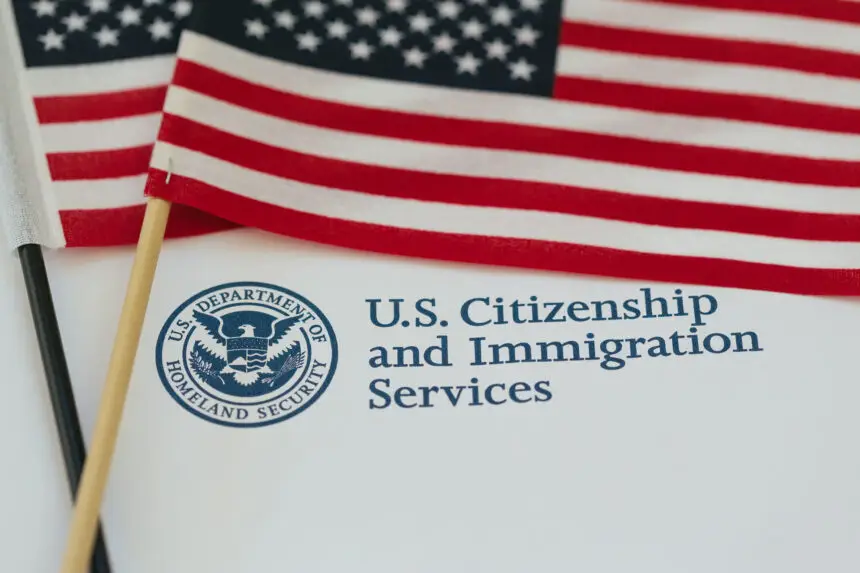The U.S. immigration administration continues to adjust the cost of immigration procedures. USCIS announced in a recent notice a new increase in certain immigration-related fees for fiscal year 2026, pursuant to H.R. 1.
These adjustments affect several essential forms for asylum seekers, Temporary Protected Status (TPS) beneficiaries, certain individuals under humanitarian parole, as well as Employment Authorization Document (EAD) holders and applicants.
According to the agency, these increases are not arbitrary but directly tied to rising prices. “These fee adjustments reflect the inflation level between July 2024 and July 2025,” USCIS explains in its Federal Register notice.
Starting in fiscal year 2026, and “for each subsequent fiscal year,” the Department of Homeland Security (DHS) will adjust “certain of these fees based on inflation, as provided by H.R. 1.”
The new amounts will take effect January 1, 2026.
The agency warns that any application submitted on or after this date must include the applicable new fee. “If you submit an application postmarked on or after January 1, 2026, that requires one of these H.R. 1 fees, you must include the new amount for the benefit you are seeking,” USCIS emphasizes.
Fees Increasing as of January 1, 2026
The table published by USCIS details precisely which forms are subject to this inflation indexing. These are modest increases in absolute value ($5 to $10), but they affect particularly vulnerable populations: asylum seekers, TPS beneficiaries, and individuals under humanitarian parole.
Key changes include:
Annual Asylum Application Fee
- Previous amount: $100
- New amount: $102
USCIS notes this fee is “currently suspended by court order,” meaning it is not collected in practice at present, but the official amount is still adjusted in the regulations.
Form I-765 – Employment Authorization Document (EAD) Application for Multiple Categories:
I-765 – Initial EAD for asylum applicant
- Previous amount: $550
- New amount: $560
I-765 – Initial EAD for parole beneficiary
- Previous amount: $550
- New amount: $560
I-765 – EAD renewal or extension for parole
- Previous amount: $275
- New amount: $280
I-765 – Initial EAD for Temporary Protected Status (TPS) beneficiary
- Previous amount: $550
- New amount: $560
I-765 – EAD renewal or extension for TPS
- Previous amount: $275
- New amount: $280
These amounts apply to both initial work permit applications and renewals, depending on the person’s status (asylum, TPS, or parole).
Form I-131, Part 9 – EAD requested when authorizing a new parole period (re-parole)
- Previous amount: $275
- New amount: $280
Form I-821 – Application for Temporary Protected Status (TPS)
- Previous amount: $500
- New amount: $510
For TPS applicants, the increase affects both the application form (I-821) and, in many cases, the associated work authorization document (I-765), representing a significant cumulative cost increase for affected families.
Fees Remaining Unchanged
The same Federal Register notice also specifies that certain fees are not changing for fiscal year 2026. USCIS published a second table listing amounts that remain stable:
I-589 – Initial filing fee for asylum application
- Previous amount: $100
- Current amount: $100
I-765 – EAD renewal or extension for asylum applicant
- Previous amount: $275
- Current amount: $275
I-360 – Fee for Special Immigrant Juveniles (Foreign youth meeting specific protection criteria)
- Previous amount: $250
- Current amount: $250
USCIS adds that for certain other fees, including those related to the “immigration parole fee,” DHS will publish a separate notice detailing future inflation-based adjustments.
Annual Indexing Becomes Permanent
Beyond the amounts themselves, one key element of this announcement is confirmation of the recurring nature of these adjustments. “Beginning in fiscal year 2026, and for each subsequent fiscal year, the Department of Homeland Security will adjust certain of these fees to account for inflation,” USCIS emphasizes, explicitly referencing provisions of H.R. 1.
Concretely, this means that immigrant families, asylum seekers, TPS beneficiaries, youth protected under Special Immigrant Juvenile status, and other categories of non-citizens could see their fees increase annually, keeping pace with official inflation. While the increases announced for 2026 remain limited (often around 2%), their cumulative effect over several years could impact household budgets.
Practical Precautions for Applicants
USCIS stresses the importance of using the new amounts starting January 1, 2026. Any application sent after this date with the old fee risks rejection as incomplete. The agency reminds users: “If you submit an application […] that requires one of these fees, you must include the new amount for the benefit you are requesting.”
For community organizations, attorneys, immigrant rights advocates, and application preparers, this timeline requires rapid updating of information provided to the public, internal forms, and fee schedules. Any error in amount on a check, money order, or electronic payment could delay already lengthy and complex procedures.
A Major Issue for Immigrant Communities
While these amounts may seem limited compared to other immigration costs, this announcement comes at a time when many immigrant families already face significant financial constraints: high rents, difficult access to stable employment, legal fees, remittances to home countries, etc.
This new adjustment serves as a reminder that the administrative path toward regularization, protection, or stability in the United States remains costly. It also underscores the importance for affected individuals to stay informed about regulatory changes, carefully verify official instructions, and, when possible, seek assistance from professionals or specialized organizations.
For more details, applicants are encouraged to consult USCIS and Federal Register official notices directly, and to verify amounts applicable at the precise time they prepare or file their applications, particularly as January 1, 2026, approaches.

https://ctninfo.com/uscis-announces-2026-increase-for-certain-immigration-fees-indexed-to-inflation/







